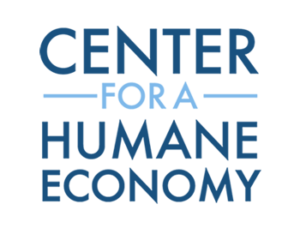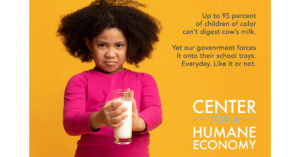Press Release

- For Immediate Release:
- Contact
- Marty Irby
- marty@animalwellnessaction.org
Civil Rights, Nutrition, and Animal Groups Call for an End to Dairy Industry Monopoly in Public Schools That Sickens Millions of Lactose-Intolerant Kids
WASHINGTON, D.C. – Civil rights, social justice, and health organizations are calling on the U.S. Department of Agriculture to address an unfair and discriminatory food policy embedded in the National School Lunch Program (NSLP).The dairy industry has a monopoly on distributing nutritious beverages in our federal food assistance programs to 30 million kids even though upwards of three-quarters of people of color are lactose intolerant and cannot digest the product without becoming ill or uncomfortable.

The National Urban League (led by Marc Morial), National Action Network Washington Bureau (founded and headed by Rev. Al Sharpton), NAACP’s Maryland State Conference, Switch4Good, Coalition for Healthy School Food, The Center for a Humane Economy, Progressive Democrats of America, and 21 other co-signing organizations have asked the USDA Equity Commission—charged with addressing racial equity issues in national food and agriculture programs—to recommend changes including a proportional reimbursement to public schools for soy milk. The organizations have demanded the commission conduct an investigation and formulate policy shifts to create a more equitable nutrition program, learning environment, and put an end to dietary racism.
Up to 80 percent of Black and Latino people, up to 95 percent of Asians, and more than 80 percent of Indigenous Americans cannot digest lactose without adverse effects. In contrast, only about 15 percent of people of European descent are lactose-intolerant.
The USDA dictates that cow’s milk must be served with every meal for schools to be reimbursed by the NSLP. Currently, only families that provide schools with a doctor’s note may be offered an alternative. The letter-signers maintain that the requirement for a doctor’s note places an undue cost and burden on parents.
The NSLP serves more than 30 million children in more than 100,000 schools, and children of color account for a large percentage of that total in the NSLP.
“The USDA’s own anti-discrimination regulation mandates that the agency take action to correct the current injustice against lactose-intolerant children; and, failure to act delegitimizes the very existence of the USDA Equity Commission,” said Jo Saint-George, Chief Legal Officer for Women of Color for Equal Justice.
“If Black lives matter, so does our health and nutrition, but the National School Lunch Program has consistently failed children of color,” said Milton Mills, M.D., an urgent care physician in Washington, D.C., and a consultant to the Center for a Humane Economy and Switch4Good. “Either schoolchildren drink the milk they’re given and suffer in class while they’re trying to learn, or they go without a nutritionally significant portion of their meal.”
“It is hard to imagine a more inequitable and socially unjust USDA practice than force-feeding cow milk to children who get sick from drinking it,” said Switch4Good executive director Dotsie Bausch. “If 80% of white children got sick from drinking milk, schools, parents, and government agencies would rightly fall over themselves to find a solution.”
The inability to break down lactose in milk and other dairy products into simpler sugars for absorption into the bloodstream results in undigested lactose remaining in the lower gastrointestinal tract. Symptoms often include diarrhea, nausea, cramping, bloating, and, in severe cases, vomiting.
“There is a simple fix to a supposed food assistance program that does anything but assist the kids: reimburse schools so they can offer a nutritionally equivalent fluid beverage that doesn’t force kids to spend two hours of the school day on the toilet or doubled over in the classroom,” said Wayne Pacelle, president of the Center for a Humane Economy. “Give schools and kids an option.”
In addition to digestive symptoms, cow milk is the most common food allergen for infants and young children. Symptoms include rashes, hives, wheezing, vomiting, and anaphylaxis; long-term effects include compromised immune systems, respiratory, gastrointestinal, and skin problems.
In 2020, the U.S. Dietary Guidelines recognized soy milk as a nutritionally equivalent fluid beverage product.
The U.S. government has long provided funding, marketing, and policy initiatives to support the dairy industry. The National School Lunch Program, established in 1946, was created to “encourage the domestic consumption of nutritious agricultural commodities” including milk. The USDA’s Agricultural Marketing Service manages the Dairy Research and Promotion Program, also known as the Dairy Checkoff Program, to promote dairy consumption. The program works with public schools to advertise milk to children.
The Center for a Humane Economy (“the Center”) is a non-profit organization that focuses on influencing the conduct of corporations to forge a humane economic order. The first organization of its kind in the animal protection movement, the Center encourages businesses to honor their social responsibilities in a culture where consumers, investors, and other key stakeholders abhor cruelty and the degradation of the environment and embrace innovation as a means of eliminating both.